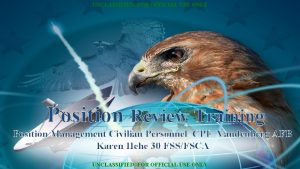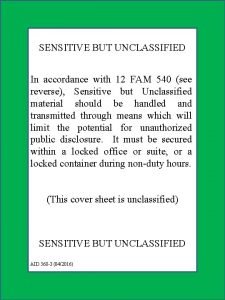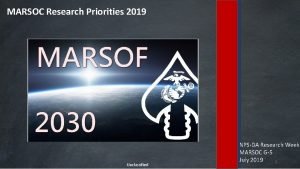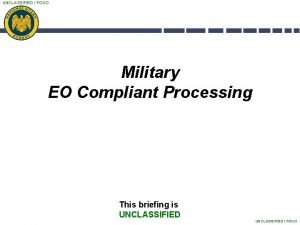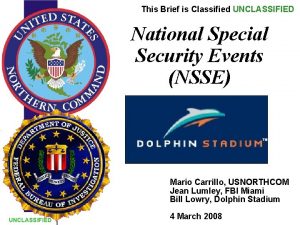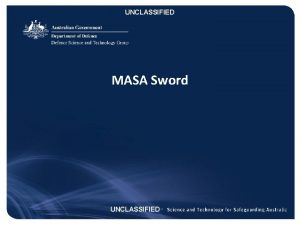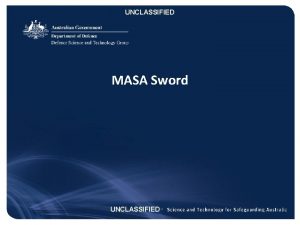Unclassified U S Army Research Institute for the










- Slides: 10

Unclassified U. S. Army Research Institute for the Behavioral and Social Sciences (ARI) Applications of Savoring to Enhance Resilience in Military Organizations Do. D HFE VTAG #74 Readiness and Resilience November 2020 DISCLAIMER: The research described herein was sponsored by the U. S. Army Research Institute for the Behavioral and Social Sciences, Department of the Army. The views expressed in this presentation are those of the author and do not reflect the official policy or position of the Department of the Army, DOD, or the U. S. Government. Dr. Anton I. Sytine Research Psychologist anton. i. sytine. civ@mail. mil /706 -545 -7288 Unclassified Controlled by: ARI Unclassified Distribution Statement A POC: Anton I. Sytine, 706 -545 -7288

Unclassified Research Objective • Objective: To explore applications of the savoring concept to military organizational contexts in order to develop and validate assessment and feedback tools to enhance emotional self-regulation competencies for military personnel. • Current Status: Reviewed literature on savoring positive experiences and how these activities may relate to resilience among both military and civilian personnel. Exploring COAs for the next phases of the research, involving (a) the investigation of critical work contexts where military personnel may apply key savoring strategies, and (b) the development and validation of formative assessment and feedback tools to enhance targeted competencies. Unclassified 2

Unclassified Agenda • Savoring Concept • Assessment of Savoring • Savoring and Resilience • Applications of Savoring in Military Organizations • Questions Unclassified 3

Unclassified Savoring Concept • Savoring described individual control over positive emotions through generating, intensifying, and prolonging positivity from positive events. • Savoring behaviors include positive anticipation, intensification of positive feelings in the moment, and positive reminiscence. • Savoring is positively associated with a multitude of individual outcomes related to work performance, such as: positive affect, optimism, resilience, creativity, and affective commitment. • Savoring is negatively associated with individual outcomes that challenge work performance, including anxiety disorders, depression, and work related burnout. Unclassified 4

Unclassified Assessment of Savoring • Savoring is often measured using a two-factor model reflecting amplifying or dampening responses to events; otherwise referred to as up-regulating and down-regulating. Subfactors may categorize savoring strategies in past, present, or future and as cognitive or behavioral terms. • Measures of savoring – Savoring Beliefs Inventory (SBI; Bryant 2003) • Measures how savoring is derived from positive anticipation, savoring positive moments, and reminiscing about past positive experiences – Ways of Savoring Checklist (WOSC; Bryant & Veroff, 2007) • Includes both cognitive and behavioral responses to positive events • 10 scales include: sharing with others, memory-building, counting blessings, self-congratulation, comparing, sensory-perceptual sharpening, absorption, behavioral expression, temporal awareness, and kill-joy thinking Unclassified 5

Unclassified Savoring and Resilience • Substantial research has also revealed a positive relationship between savoring positive experiences and resilience. Findings have shown that those who savor more also tend to have higher resilience. • Savoring has been found to interact with resilience to significantly predict greater happiness, satisfaction with life, and fewer symptoms of depression and burnout, especially for those who reported lower resilience. – As such, practicing savoring may elicit more positive emotions and compensate for deficits in resilience and promote positive well-being. Unclassified 6

Unclassified Applications of Savoring in Military Organizations • Overall, little research has been done on savoring-related competencies, behaviors, and strategies in military samples. • Among Soldiers in OIF and OEF, savoring was found to be associated with fewer symptoms of depression and PTSD related to combat exposure (Sytine, Britt, Pury, & Rosopa, 2018). • The positive association found between savoring and resilience, affective commitment, work engagement, and diminished symptoms of work related burnout in non-military samples may be investigated among military personnel. • Military personnel may be able to enhance resilience by engaging in savoring behaviors and thereby facilitate affective commitment and work engagement in the military via increasing positive affect and outlook; while also increasing the buffer between negative experiences and personnel outcomes. Unclassified 7

Unclassified COA for the Second Phase of Research • Contextualize Savoring for Military Applications – Characterize selected operational contexts across the military, identifying critical work contexts (situations) that require military personnel to engage in emotional self-regulatory strategies. • Savoring Process – Update and refine existing savoring competency assessments to be applicable to various military organizations and in different work contexts. • Military Savoring Tool – Develop an competency assessment and development tool focused on enhancing effective savoring behaviors for personnel in military organizations. Unclassified 8

Unclassified Conclusions • Savoring has been shown to be positively associated with a multitude of personal outcomes, including resilience. Savoring may enhance an individual’s ability to face adversity by generating more positive emotions that compensate for deficits in resilience. Thus, through enhancing our military and civilian personnel’s ability to savor positive experiences, we are readying them with an ability and strategy to face unique pressures and demands associated with the future operating environment. • Future research should focus on applications of the savoring concept in military contexts to produce individualized competency assessment and development tools, targeting enhancement of positive emotional selfregulation strategies to counteract potential performance challenges resulting from high-stress and unpredictable future operating environments. Unclassified 9

Questions 10
